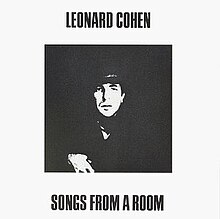Songs from a Room
| Songs from a Room | ||||
|---|---|---|---|---|
 |
||||
| Studio album by Leonard Cohen | ||||
| Released | April 7, 1969 | |||
| Recorded | October 1968 | |||
| Studio | Columbia Studio A, Nashville | |||
| Genre | Contemporary folk | |||
| Length | 35:38 | |||
| Label | Columbia | |||
| Producer | Bob Johnston | |||
| Leonard Cohen chronology | ||||
|
||||
| Professional ratings | |
|---|---|
| Review scores | |
| Source | Rating |
| AllMusic | |
| Pitchfork | 8.8/10 |
| Rolling Stone | negative |
| Rolling Stone |
|
| Q | |
| Uncut | |
Songs from a Room is the second album by Canadian musician Leonard Cohen, released in 1969. It reached No. 63 on the US Billboard Top LPs and No. 2 on the UK charts.
The recording sessions for Songs From a Room began in Hollywood in May 1968 with David Crosby as producer. That didn't work out, and the album was eventually produced in Nashville, Tennessee, with producer Bob Johnston (two of the tracks from the Crosby sessions are included as bonus tracks on the 2007 remastered version). Cohen reportedly said he chose Johnston to achieve the spartan sound he considered appropriate for his songs after the disputes he had with John Simon during the mixing sessions of Songs of Leonard Cohen. At the time, Johnston was best known for producing Bob Dylan, Johnny Cash and Simon and Garfunkel. As Anthony Reynolds observes in his book Leonard Cohen: A Remarkable Life, "Since at this point in time Cohen was something of a hybrid of all of these acts, Cohen moved from the Chelsea in New York City to Franklin, Tennessee, where he lived on a farm 30 miles from Nashville itself. Cohen recorded some demos on the actual farm and otherwise immersed himself in a version of the country life."
Unlike his augmented debut, Cohen's sophomore effort is austere by comparison, lacking drums and featuring a stripped-down approach that emphasize the words rather than the musical arrangements. In 2001, Cohen admitted to Sylvie Simmons of Mojo, "It's very stark. A lot of my friends who were musical purists had castigated me for the lushness and over-production of my first record and I was determined to do a very simple album." The sessions in Nashville began in the fall of 1968 at Columbia's Studio A on 16th Avenue in Nashville. Johnston enlisted a smaller coterie of musicians than had backed Cohen on his debut album, including Ron Cornelius playing acoustic and electric guitar, Charlie Daniels playing bass, fiddle and acoustic guitar, Elkin "Bubba" Fowler contributing banjo, bass and acoustic guitar, while Johnston himself played keyboards. The album also features some prominent (if strictly ornamental) jaw harp. As biographer Ira Nadel notes in the 1996 Cohen biography Various Positions, although Cohen still showed signs of insecurity in the recording studio, producer Johnston created a hospitable atmosphere: "In the studio, Daniels and the other musicians were told to listen to Cohen in order to get into the songs. It was like mixing colors; you had to be one of the colors for it to work. Johnston later referred to the album as a painting, not a record, and described his role as 'a musical bodyguard,' protecting Cohen and his music from artificial intrusions and falsification of sound." According to Nadel, Johnston felt that French voices would enhance "The Partisan" so he and Cohen flew to France and overdubbed three female French singers.
...
Wikipedia
